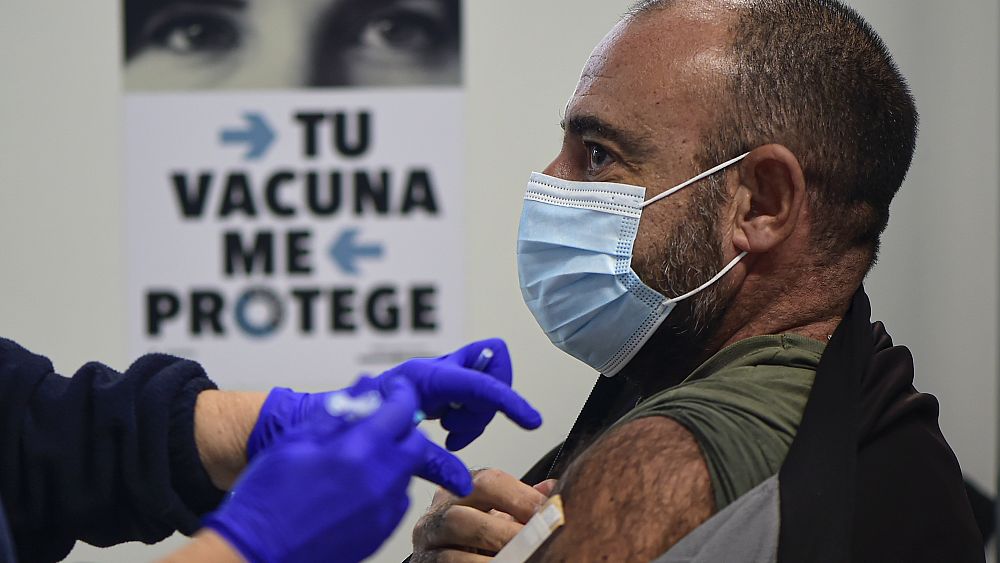
As COVID-19 cases surge in Europe there’s been more focus on convincing the unvaccinated to get the jab.
So far the measures have ranged from COVID passes to lockdowns targeting those without the vaccine.
But now more countries are considering mandatory vaccination. On Wednesday, European Commission President Ursula von der Leyen called for an EU discussion on the topic.
While vaccine mandates exist in many countries for children — for example to immunise against measles — ethics experts say it is more difficult to require adults to get inoculated
Here’s a look across Europe at the conversation on mandatory COVID vaccinations.
Austria
From February 1, vaccination will be mandatory in Austria, the first compulsory vaccination requirement in Europe.
The move came days after Austria attempted a lockdown on the unvaccinated which was quickly extended to a full nationwide lockdown.
Austrian Chancellor Alexander Schallenberg said it was the only way to get out of a vicious cycle of waves of the virus.
Greece
Greece will start fining people over the age of 60 who do not get vaccinated.
They will be fined €100 per month if they don’t receive the jab by 15 January.
Prime Minister Kyriakos Mitsotakis defended the measure saying the older group represented 90% of deaths due to COVID-19.
From September, Greece has required that health workers in public and private facilities be vaccinated. They have also tightened restrictions on the unvaccinated recently.
Germany
German MPs are expected to vote on making vaccination mandatory.
Olaf Scholz, who is set to become German chancellor later this month, said there would be a vote in the Bundestag and that he hoped and thought MPs would vote in favour of it.
Greens co-leader Robert Habeck, who reportedly could become Vice-Chancellor in the new government, told Deutsche Presse-Agentur that “compulsory vaccination would be a far-reaching encroachment on the freedom of the individual. But it protects life and ultimately the freedom of society.”
“In order to keep the upper hand in the future and prevent a fifth wave, we must now make preparations for a general vaccination obligation.”
Angela Merkel, who previously said vaccination would not be compulsory, said on Thursday (December 2) that if she were a member of the Bundestag, she would vote in favour of mandatory vaccination.
Italy
Italy was one of the first countries to mandate vaccination for health professionals in April in an effort to protect patients.
“Vaccination is an essential requirement for the exercise of the profession,” Italy’s health ministry said.
They recently extended that obligation to teachers and administrative school staff, the military, police and rescue workers. It will enter into force from December 15.
Instead of mandating vaccines further, Italy strengthened its “green pass”, requiring recovery from COVID-19 or vaccination in order to access shows, sporting events, and nightclubs.
France
From September, France has required health and care professionals, firefighters and transport workers to be vaccinated.
People with jobs who are in contact with the public must have a health pass in order to go to work proving that they are vaccinated against or recovered from COVID-19 or that they have had a negative test result.
Access to bars, restaurants, gyms and many events require a health pass as well.
Health minister Olivier Véran said mandatory vaccination was not the “choice France had made”, explaining that it would be more difficult to enforce for adults than it currently is for children.
United Kingdom
COVID-19 vaccines will be mandatory for health and social care workers by April 1 in England, UK health secretary Sajid Javid said in November as COVID-19 cases soared.
Javid said in a BBC interview however that he did not think the UK would “ever look at” mandating vaccines for the general population, stating that vaccine hesitancy was low in the country.
Sweden
A spokesperson for the Swedish health minister told Euronews the government does not plan to introduce compulsory vaccination.
“Keeping vaccinations voluntary, building trust and helping citizens make informed decisions, has proved to be successful in reaching high vaccination rates in Sweden,” the spokesperson said.
From December 1, Sweden imposed a COVID-19 pass for entry to public indoor events with more than 100 people.
The pass attests that the holder has been fully vaccinated, tested negative for the virus, or recovered from the disease.
Hungary
Vaccination is required in Hungary for health workers, state school teachers and people working in state institutions.
Private companies are allowed to decide whether workers must be vaccinated or not.
Hungarian officials, including Prime Minister Viktor Orban, have urged citizens to get vaccinated as soon as possible.
Denmark
Prime Minister Mette Frederiksen said on Wednesday that they “would very much like it to be the individual who makes the decision”.
Denmark has issued a COVID-19 pass requiring vaccination, recovery from the virus, or a negative test to access much of public life including restaurants, cinemas and hairdressers.
Switzerland
Switzerland’s government states that “legally, a general obligation for the population to be vaccinated is excluded”.
“Transparent and understandable information should allow each person to make their decision freely,” the public health office says.
The government or local cantons can however impose vaccination on “vulnerable groups of people and for certain people, under very strict conditions.” However, no one can be “forced” to get vaccinated.
The Swiss recently voted in favour of COVID-19 measures, including maintaining the use of health passes to access public life, in a referendum.
Latvia
Latvia has measures in place that restrict people who are unvaccinated.
From 15 December, workers must present a COVID-19 vaccination or recovery certificate. In state institutions, this applies to people who work remotely as well.
A COVID-19 pass, proving vaccination or recovery from the virus, is also required to access retail stores, cultural events and restaurants.